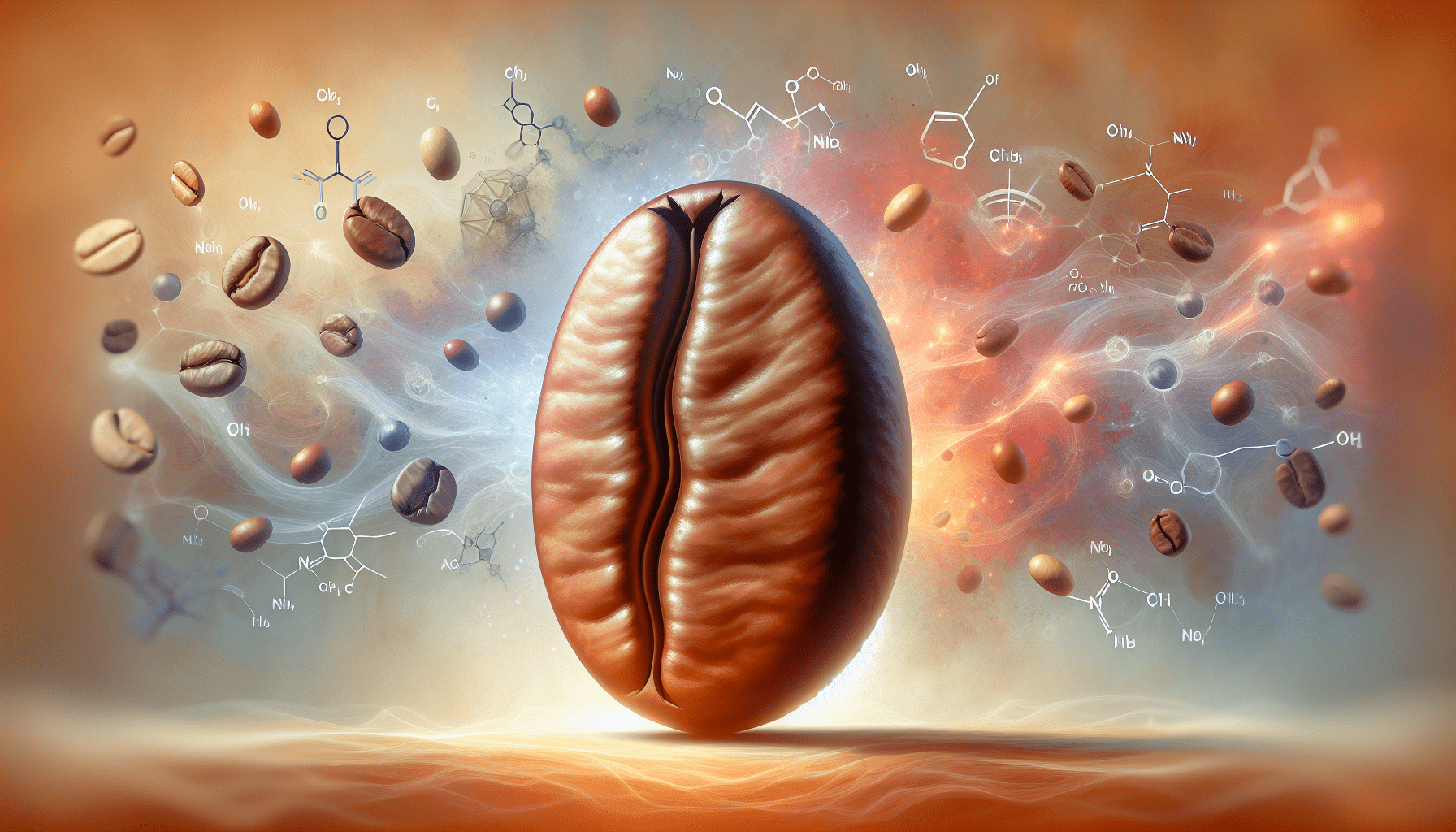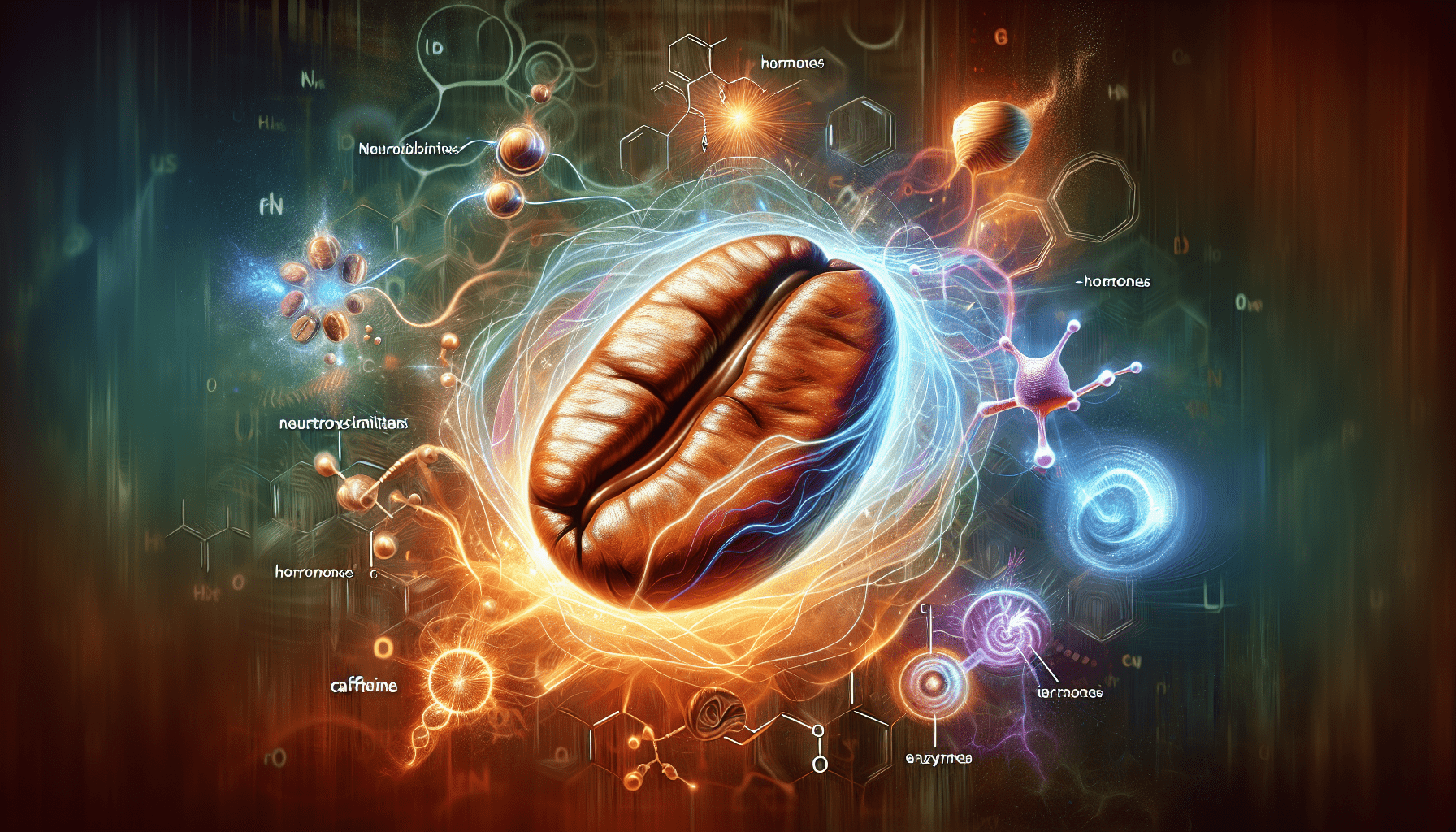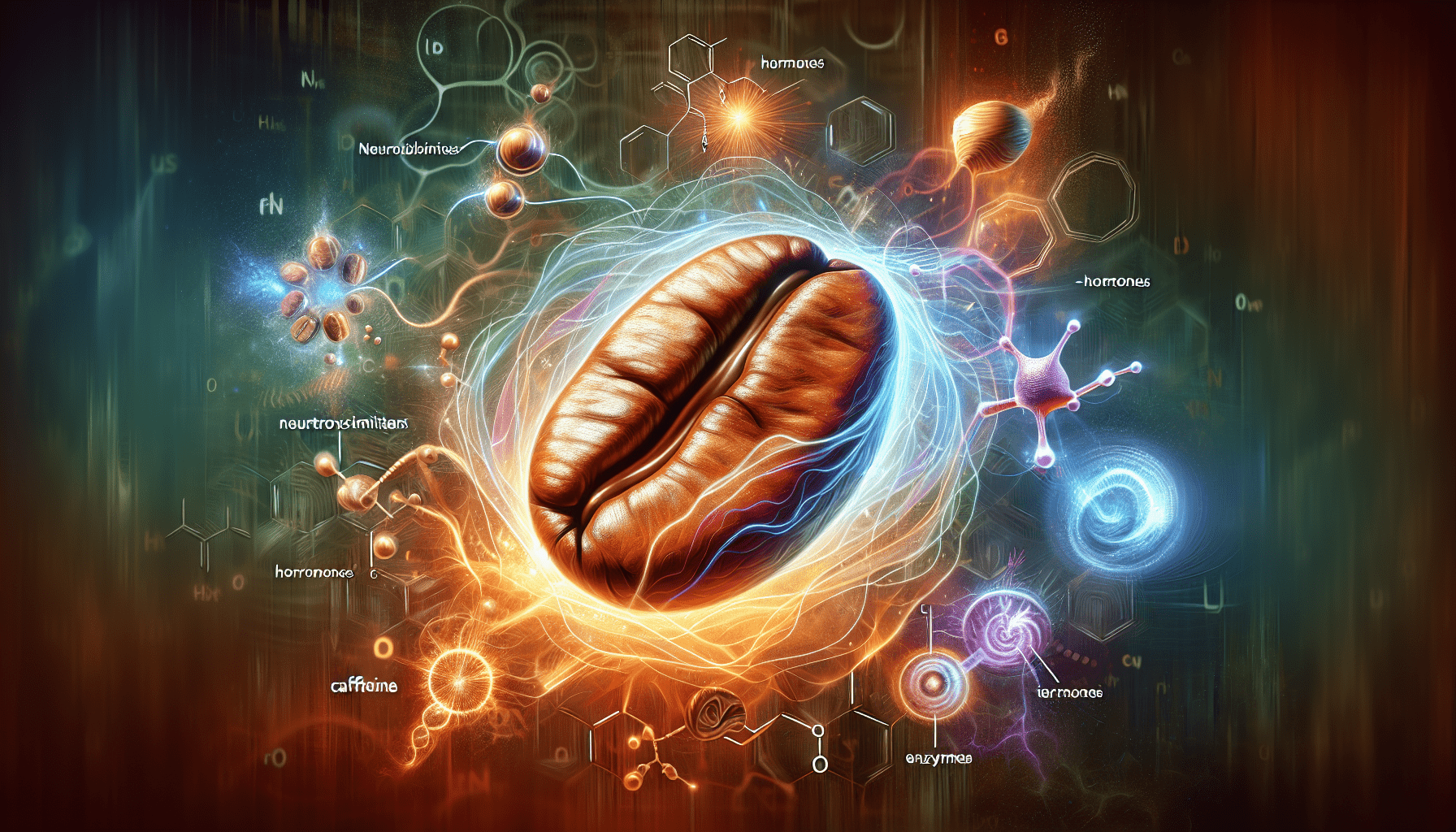Let’s explore the fascinating world of caffeine, that magical substance that seems to have the power to wake us up and keep us going throughout the day. We all know that cup of coffee or tea can provide a much-needed boost, but have you ever wondered how caffeine actually works? In this article, we will uncover the mechanism behind this energizing stimulant and delve into the effects it has on our bodies. So grab your favorite caffeinated beverage and join us on this journey of discovery.
Understanding the Mechanism of Caffeine
Caffeine is a widely-used stimulant that many of us rely on to start our day or get through a mid-afternoon slump. But have you ever wondered how caffeine actually works and what impact it has on our bodies? In this comprehensive article, we will delve into the chemistry of caffeine, its effects on the central nervous system, its influence on the endocrine system, its effect on metabolism and energy, its cardiovascular effects, its impact on the gastrointestinal system, its effects on sleep, its psychological effects, its influence on exercise performance, and finally, its overall impact on health.
The Chemistry of Caffeine
Caffeine is a naturally occurring compound found in various plants, most commonly in coffee beans, tea leaves, and cacao beans. Chemically, it belongs to a class of compounds known as alkaloids. Its chemical formula is C8H10N4O2, and it belongs to a larger family of compounds called xanthines.
Stimulant Effects of Caffeine
One of the primary reasons people consume caffeine is for its stimulant effects. When we consume caffeine, it acts as a central nervous system stimulant, binding to and blocking receptors in the brain that are responsible for detecting adenosine, a neurotransmitter that promotes sleep and relaxation. By blocking these receptors, caffeine effectively prevents adenosine from inducing drowsiness, leading to increased wakefulness and mental alertness.

Mechanism of Action
So, how does caffeine achieve its stimulating effects? Caffeine works by inhibiting the enzyme called phosphodiesterase. This inhibition leads to an accumulation of cyclic adenosine monophosphate (cAMP) in the cells. Increased levels of cAMP promote various physiological responses, including increased heart rate, increased release of adrenaline, and enhanced release of neurotransmitters like dopamine and norepinephrine. These combined effects contribute to the overall stimulant action of caffeine.
Caffeine’s Impact on the Central Nervous System
Effects on Neurotransmitters
Caffeine affects various neurotransmitters in the brain. As mentioned earlier, it increases the release of dopamine and norepinephrine, which are associated with feelings of pleasure, improved mood, and increased attention and focus. Additionally, caffeine blocks the action of adenosine, leading to increased alertness and reduced fatigue.
Alertness and Concentration
By stimulating the central nervous system, caffeine helps increase alertness and improve concentration. It can enhance cognitive performance and reaction time, making it a popular choice for students and professionals who need to stay focused for long periods.
Caffeine Withdrawal
Regular caffeine consumption can lead to dependence, and withdrawal symptoms may occur when consumption is reduced or stopped abruptly. These symptoms can include headaches, fatigue, irritability, and difficulty concentrating. It’s important to be aware of your caffeine intake and gradually decrease it if you choose to reduce or eliminate it from your routine.

Caffeine’s Influence on the Endocrine System
Stimulating Adrenal Glands
Caffeine stimulates the adrenal glands, which are responsible for producing and releasing hormones such as adrenaline. The increased production of adrenaline can lead to a temporary boost in energy levels, increased heart rate, and improved physical performance.
Effects on Hormonal Balance
Regular consumption of caffeine may influence the balance of various hormones in the body. Studies have shown that caffeine can affect the levels of cortisol, a hormone involved in stress response, and insulin, a hormone that regulates blood sugar levels. These hormonal changes may have implications for overall health, particularly in individuals with certain hormonal imbalances or conditions.
Caffeine’s Effect on Metabolism and Energy
Increased Metabolic Rate
Caffeine has been shown to increase metabolic rate, which refers to the rate at which the body burns calories. This increase in metabolism can lead to a temporary boost in energy expenditure and may be beneficial for weight management.
Enhanced Fat Oxidation
In addition to increasing metabolism, caffeine can enhance the body’s ability to burn fat. It does this by increasing the release of fatty acids from fat tissues and promoting their utilization as a source of energy. This effect has made caffeine a popular ingredient in many weight loss supplements.
Performance Enhancement
Due to its stimulant effects and ability to enhance energy levels, caffeine has long been associated with improved physical performance. It has been shown to increase endurance, reduce perceived exertion, and enhance muscle strength and power output. These effects can be particularly beneficial for athletes or individuals engaging in high-intensity exercise.

Cardiovascular Effects of Caffeine
Blood Pressure and Heart Rate
Consuming caffeine can temporarily increase blood pressure and heart rate. While these effects are generally transient and not significant for most people, individuals with pre-existing cardiovascular conditions may need to be cautious about their caffeine intake.
Effects on Blood Flow
Caffeine has been shown to have both constricting and dilating effects on blood vessels, depending on the dose and individual response. In moderate amounts, it may improve blood flow in certain areas, such as the muscles, potentially enhancing exercise performance. However, excessive consumption or sensitivity to caffeine can lead to vasoconstriction, limiting blood supply to vital organs.
Cardiovascular Disease Risk
The relationship between caffeine consumption and the risk of cardiovascular disease is complex and still being studied. While some studies suggest a modest increase in the risk of cardiovascular events with high caffeine intake, others indicate that moderate consumption may have protective effects. As with any dietary factor, individual variability and underlying health conditions should be considered when evaluating the impact of caffeine on cardiovascular health.
Caffeine and the Gastrointestinal System
Stimulating Gastric Acid Secretion
Caffeine has been shown to stimulate the secretion of gastric acid, which aids in food digestion. While this effect can be beneficial for some individuals, excessive caffeine intake can contribute to acid reflux, heartburn, and other digestive discomforts.
Diuretic Effects
Caffeine is commonly known for its diuretic properties, meaning it increases urine production. However, the diuretic effect of caffeine appears to be mild and is not typically significant enough to cause dehydration in healthy individuals who consume it in moderation.
Impact on Digestive Function
Caffeine can also influence bowel movements by promoting contractions in the digestive muscles. This effect may lead to a laxative effect, which can be helpful for those experiencing occasional constipation. However, excessive caffeine intake can lead to increased bowel movements and gastrointestinal distress.

Caffeine’s Impact on Sleep
Sleep Quality and Latency
Caffeine’s stimulating effects can impair sleep quality and delay the onset of sleep in many individuals. Even consuming caffeine several hours before bedtime can disrupt the sleep-wake cycle, making it more difficult to fall asleep and achieve restful sleep. It is recommended to avoid caffeine consumption close to bedtime to support healthy sleep patterns.
Circadian Rhythm Disruption
Caffeine can also interfere with the body’s natural circadian rhythm, the internal clock responsible for regulating sleep and wakefulness. By delaying the release of melatonin, the hormone that promotes sleepiness, caffeine can disrupt the natural sleep-wake cycle, leading to irregular sleep patterns and fatigue.
Caffeine and Psychological Effects
Elevated Mood
Caffeine consumption is often associated with improved mood and increased feelings of well-being. This effect is primarily attributed to caffeine’s ability to block adenosine receptors and increase the release of dopamine and serotonin, neurotransmitters associated with pleasure and mood regulation.
Anxiety and Stress
While moderate caffeine consumption is generally well-tolerated, excessive intake or sensitivity to caffeine can contribute to feelings of anxiety and exacerbate stress. Caffeine’s stimulant effects can heighten alertness and lead to restlessness or jitteriness in susceptible individuals.
Caffeine Dependence and Addiction
Regular and frequent consumption of caffeine can lead to physical and psychological dependence, resulting in withdrawal symptoms when intake is reduced or stopped abruptly. Many individuals experience headaches, fatigue, irritability, and difficulty concentrating during caffeine withdrawal. Gradual reduction of caffeine intake is recommended to minimize the severity of withdrawal symptoms.

Caffeine and Exercise Performance
Improved Endurance
Caffeine’s stimulating effects can enhance endurance during prolonged exercise by reducing perceived exertion and delaying fatigue. It does this by blocking the action of adenosine, which leads to a decrease in pain perception and allows individuals to exert themselves for longer periods.
Increased Muscle Strength
Research suggests that caffeine consumption can also lead to increased muscle strength. Caffeine enhances the recruitment of motor units, which are responsible for muscle contractions, thus promoting greater force generation during resistance training.
Effects on Fatigue
Caffeine’s ability to block adenosine receptors and increase dopamine and norepinephrine release contributes to its anti-fatigue properties. By reducing perceived effort and delaying fatigue, caffeine can help individuals push through challenging workouts or competitions.
Caffeine’s Influence on Health
Bone Health
There has been some controversy regarding the impact of caffeine consumption on bone health. While excessive caffeine intake may lead to increased calcium excretion and potentially contribute to osteoporosis in certain individuals, moderate caffeine consumption does not appear to have significant negative effects on bone health.
Nutrient Absorption
Caffeine may interfere with the absorption of certain nutrients in the gastrointestinal tract. Specifically, it can reduce the absorption of iron and calcium. If you consume caffeine along with foods or supplements high in these nutrients, it is advisable to separate their consumption to optimize absorption.
Potential Protective Effects
Despite some potential concerns, research has also suggested that moderate caffeine consumption may offer certain protective effects. It has been associated with a decreased risk of certain types of cancers, including liver, colon, and breast cancers. Additionally, caffeine has been linked to a reduced risk of neurodegenerative diseases such as Parkinson’s disease.
In conclusion, caffeine is a widely consumed substance that affects various systems in the body. Its stimulant effects on the central nervous system contribute to increased alertness and can improve cognitive performance. Caffeine’s influence on the endocrine system can impact hormone balance, energy levels, and exercise performance. While caffeine has potential benefits, it is essential to be aware of individual tolerance, potential side effects, and moderation when considering caffeine consumption. As with any dietary or health-related choices, it is always advisable to consult with a healthcare professional for personalized advice.

